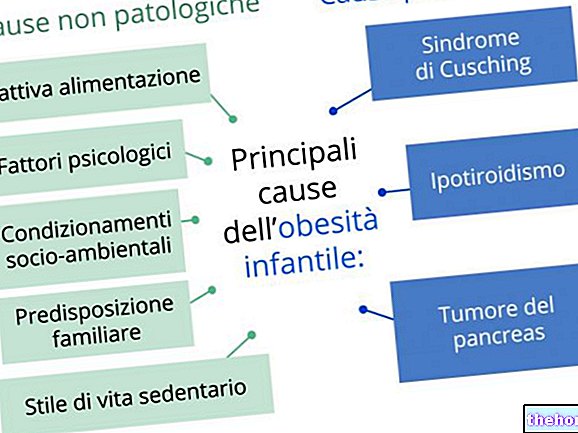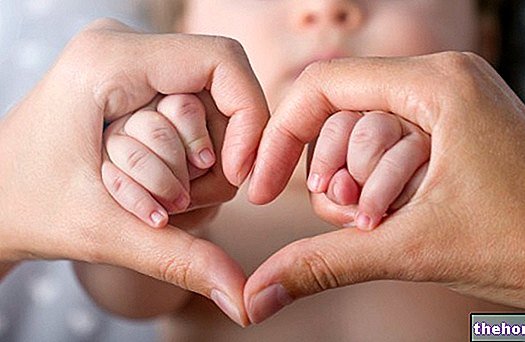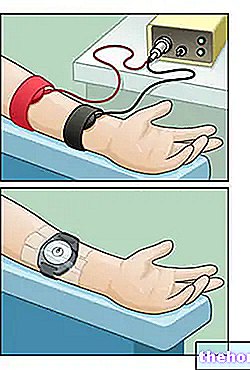Edited by Dr. Davide Sganzerla
The first rule to avoid the possible risk of obesity is PREVENT.
If the child tends to gain weight, it is necessary to intervene immediately, without waiting for him to gain too much weight. There are no rigid rules, no infallible recipes, it is enough to adopt simple behavioral precautions; above all, once sensitized to the problem, parents must never give up and let their guard down. (Confalone, 2002).
Some practical advice that the Italian Ministry of Health indicates are:
- Accustom the child to three regular meals: a not abundant but substantial breakfast, a lunch and a dinner (not excessive), interspersed with a mid-morning snack and an afternoon snack. This will avoid the "holes" between one meal and the next and will get him used to not eating after hours.
- Do not reward the child with too many snacks, especially if they are high in sugar or in any case high in calories such as snacks, ice cream, fizzy drinks, fruit juices, but prefer fruit or yogurt.
- Do not insist when the child is full or not very hungry; he may eat only to please his mother or not to be scolded; there is the risk of generating in him a distorted relationship with food.
- Limit the protein and lipid intake, alternating the consumption of meat, eggs and cheeses, foods that should never be given together; prefer fish proteins.
- Accustom the child to outdoor games and physical activity; this is important both for a correct development of the body, and because the boy will burn a lot of calories in movement.
- Respect the rhythms of sleep in order to avoid the establishment of incorrect habits (syndrome of night feeding).
When the extra pounds are already evident, further measures need to be taken. The pediatrician and the dietician are in fact the most suitable figures to prepare a targeted intervention, but it is the parents who have the most important role. The awareness of the damage that obesity can cause to the health of one's child must make parents reflect and lead them to eradicate incorrect eating habits and habits established over time. The task is difficult, but not impossible. It is necessary to focus on involvement and not prohibitions , trying not to blame the little one if he sometimes gives in to temptation, therefore without making the weight an obsession. (Confalone, 2002).
Further useful tips from the Italian Ministry of Health are:
- Empty the kitchen and refrigerator from tempting foods (chips, snacks, chocolate, fruit juices) and replace them with the right foods (water, tea, fruit, rusks, yogurt).
- Make the meal a moment of pause to be together and talk (when you watch television you don't notice how much or what you eat).
- Prevent the baby from eating too quickly; in doing so, he never gets enough and after a snack he immediately asks for another one.
- Prefer home-made foods to packaged products; the condiments are better calculated and the raw materials to be used are chosen.
- Eliminate more elaborate dishes by replacing them with others cooked in a simple way, without too many toppings.
- Accustom the little one to take a fair amount of cooked or raw vegetables every day, richer in fiber, which fill the stomach and slow down the assimilation of the substances introduced.
- Moderate the quantities.
- Do not associate food with the idea of something "special", nor use it as a reward.
- Reduce the time spent on television / computers in favor of more dynamic activities.
- Encourage the child to walk and take the stairs rather than taking the elevator.
- Encourage regular sporting activity trying to satisfy the child's preferences and sensitivity (from bike rides to football matches, from swimming in the pool to gymnastics in the gym).
- Regularly submit the child to pediatric follow-up visits.
In conclusion, it is the role of the state to foster and relentlessly promote large-scale awareness campaigns to raise awareness of the problem in all sectors of society, including that of health professionals (who are often not sufficiently prepared to tackle the problem). , providing information both on the risks that obesity can cause, and on the behaviors to adopt to avoid this pathology.
Some social actions could be:
- intervene with laws to regulate and ensure strategies for the reduction of obesity;
- increase the amount of hours per week of physical education in primary and secondary schools;
- to increase the quality of physical education in primary and secondary schools;
- raise awareness of the problem among families with advertisements, television programs and magazines;
- create and improve sports infrastructures (gyms and parks);
- promote the formation of associations and sports centers;
- encourage food industries to bring low-calorie and more nutritious foods to market;
- levy taxes on unhealthy foods and give subsidies for the promotion of healthy and nutritious foods;
- formulate dietary standards for school lunch programs;
- eliminating and replacing sweet drinks and snacks in vending machines in schools with healthier food and drinks;
- clearly inform the consumer by applying clear nutrition labels on foods and banning inconsistent and incorrect information;
- enforce restrictions on advertising food to children.
It is clear that these actions concern different levels, some at the local level and others at the national and international level; however, all of them need the indispensable support of governments and their respective ministries.
Other articles on "Childhood obesity, the solutions to the problem"
- Childhood obesity incidence in Europe and the world
- Childhood obesity
- Childhood Obesity Causes
- Childhood obesity consequences
- Childhood obesity incidence Italy
- Childhood obesity bibliography




























